Pad Kee Mao (Thai Drunken Noodles) is a quick and flavorful stir-fry made with wide rice noodles, ground pork or chicken, fresh vegetables, and Thai basil. Tossed in a savory, slightly spicy sauce, this classic Thai street food is perfect for a fast weeknight dinner.
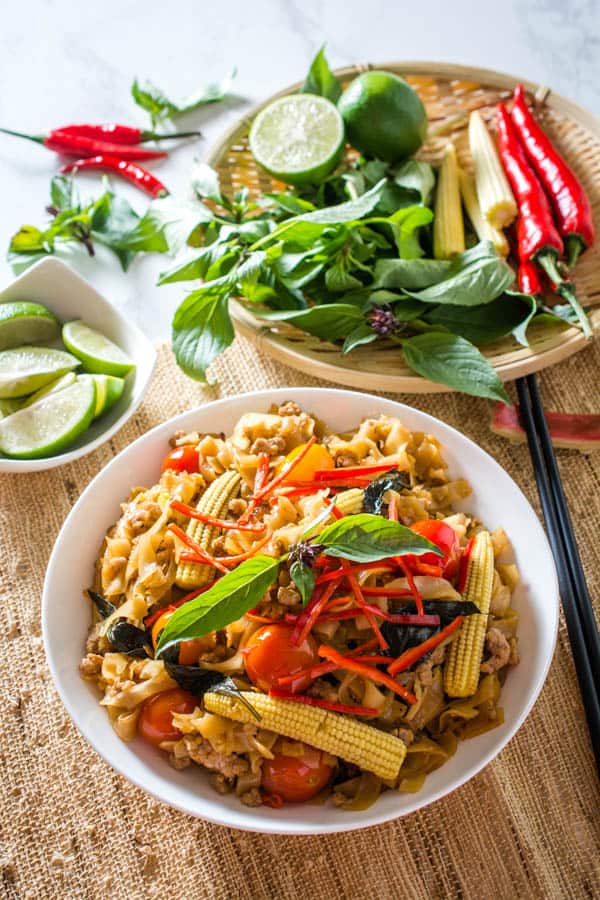
If you’re craving bold Thai flavors, this Pad Kee Mao recipe (also known as Thai Drunken Noodles) definitely delivers. It’s a savory noodle stir-fry made with wide rice noodles, ground pork or chicken, crisp baby corn, juicy tomatoes, and fragrant Thai basil.
Pad Kee Mao is similar to Pad See Ew, but the flavor is bolder, a little spicier, and more aromatic. Kind of like a mashup between Pad See Ew and Gai Pad Krapow. I love ground pork for the rich, savory flavor it brings. It works so well with the noodles and sauce.
Despite the name, there’s no alcohol in these drunken noodles. One theory of how the name originated is that someone came home drunk and threw together whatever ingredients were on hand. Another is that it's the perfect hangover cure. Either way, it pairs ridiculously well with an ice-cold beer.
Once you’ve got your ingredients prepped, this stir-fry comes together fast! Perfect for a weeknight dinner that tastes like it came from your favorite Thai restaurant.
Noodles for Pad Kee Mao
Pad Kee Mao is made with wide rice noodles, the same kind used for Pad See Ew and similar to Pad Thai noodles; just much wider. Their soft, chewy texture makes them perfect for soaking up all that savory sauce.
If you can find fresh wide rice noodles, that’s the best option. Otherwise, dried wide rice noodles work too. Just soak them in warm water for about 30 minutes until pliable, then drain well. Do not boil them as they will get too mushy.
After draining, toss the noodles with a bit of cooking oil to keep them from sticking. I do this whether I’m using fresh or dried noodles — it makes stir-frying so much easier and helps the sauce coat every noodle evenly.
This recipe calls for 1 pound of fresh wide rice noodles or 8 oz of dried wide rice noodles.
How to Make Pad Kee Mao
Start by mixing up the sauce. In a small bowl, combine 1 tablespoon soy sauce, 1 tablespoon oyster sauce, 1 tablespoon rice vinegar, 2 teaspoons fish sauce, 1 teaspoon dark soy sauce (or sweet soy sauce), and 2 teaspoons brown sugar. Set this aside for now.
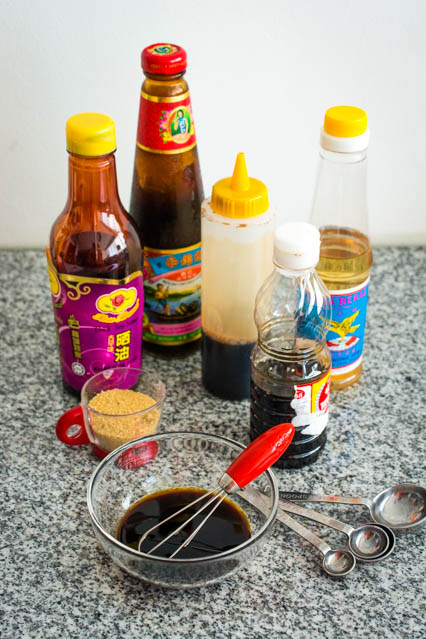
Heat 2 tablespoons of cooking oil in your wok over medium-high heat. Add ½ a pound of ground pork, and stir-fry until the pork is fully cooked.
Remove the pork from the wok and set aside.
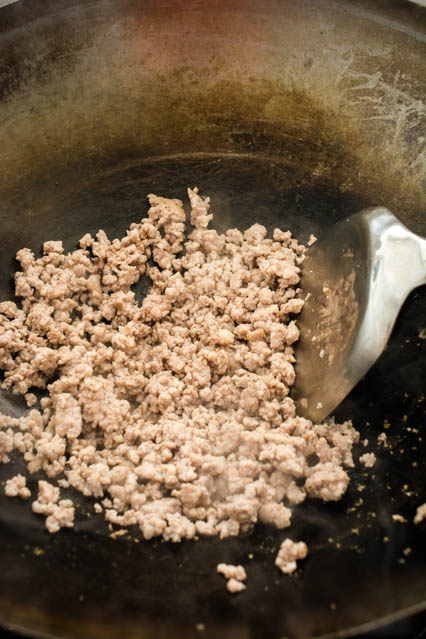
Add another 1 tablespoon of oil to the wok, then toss in 2 cloves of minced garlic, ½ a small onion (sliced), and 6 baby corn sliced lengthwise.
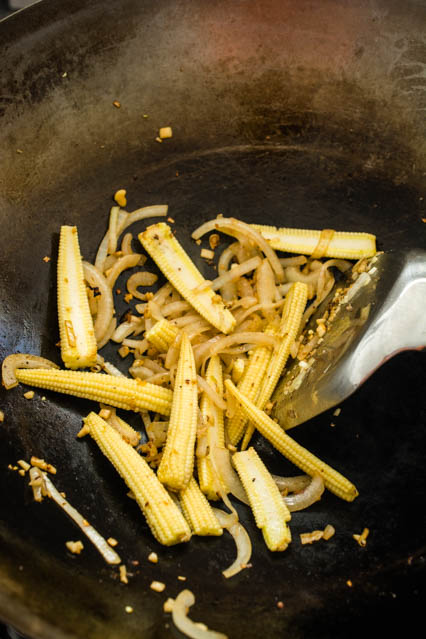
If you like some heat, add 1 thinly sliced Thai bird chili, or go for 2 if you’re into serious spice. You can skip it altogether for a milder dish.
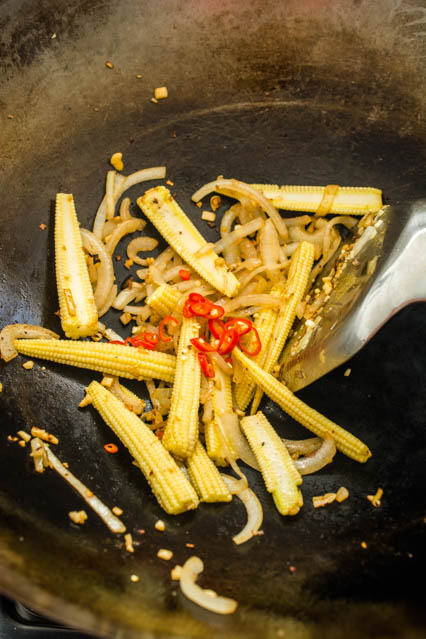
Add your noodles to the wok (1 pound of fresh wide rice noodles or 8 ounces of soaked and drained dried noodles).
Would you like to save this?
Pour in the sauce and stir to coat the noodles evenly.
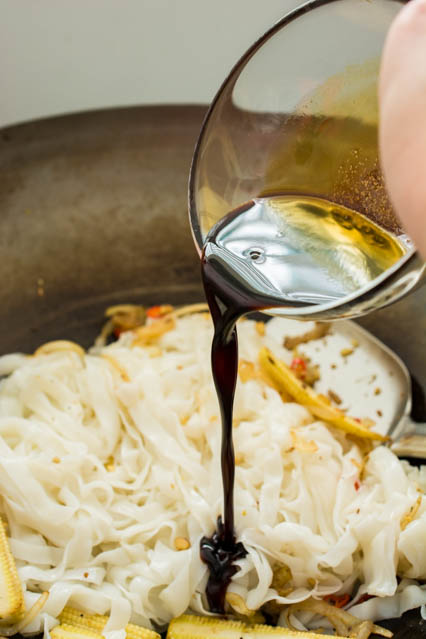
Return the cooked ground pork to the wok.
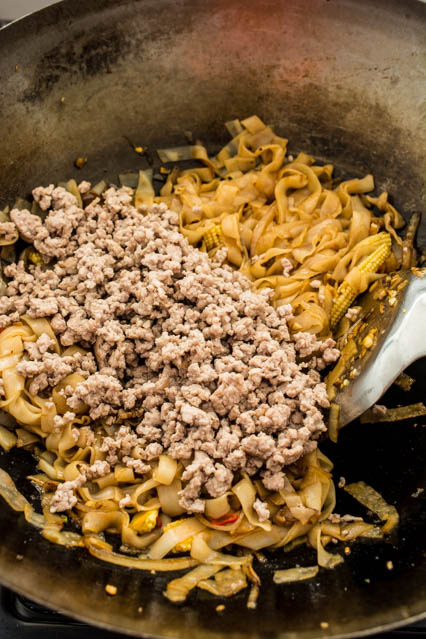
Add 2 cups of cherry or grape tomatoes, and 2 cups of fresh Thai basil leaves.
Give everything a quick stir until the basil is just wilted and the tomatoes are warmed through.
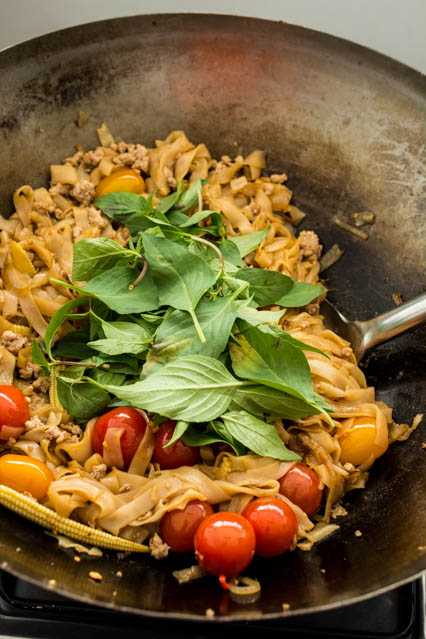
Serve immediately with lime wedges and extra basil on the side if you like.
Enjoy!
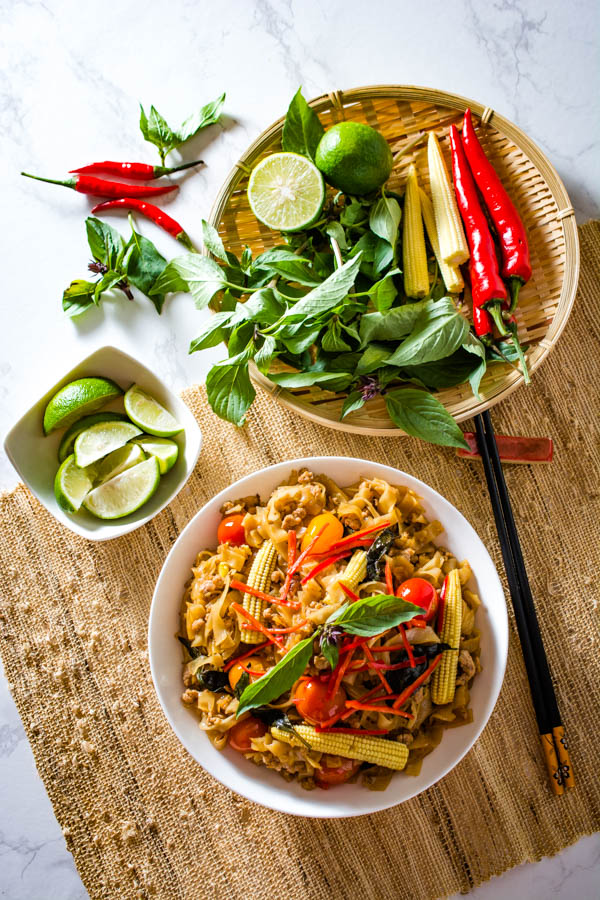
💡 Pro Tips for the Best Pad Kee Mao
Prep everything before you start cooking. This dish moves fast once the wok heats up, so have your sauce, protein, veggies, and noodles ready to go.
Don’t skip the Thai basil. It’s what gives Pad Kee Mao its signature aroma and flavor. If you can’t find Thai basil, holy basil works too - or in a pinch, use regular basil, but the flavor won’t be quite the same.
Adjust the spice to your taste. Thai bird’s eye chilies are spicy! Start with one if you’re not sure. You can always add more heat with chili flakes or a drizzle of chili oil at the end.
Use a well-seasoned wok to prevent sticking. Pad Kee Mao can get a little sticky, especially if you're using fresh rice noodles. A well-seasoned carbon steel wok makes a big difference, and don’t be afraid to use a touch more oil when stir-frying to help coat the noodles evenly and keep them from tearing or clumping.
If you’re using a nonstick wok, keep the heat moderate to avoid damaging the coating. You may also want to cook in smaller batches to prevent the noodles from steaming.
Let soaked noodles air-dry briefly before cooking. If you're using dried wide rice noodles, give them a few minutes to sit in a colander after draining. This helps remove excess moisture so the noodles stir-fry better and absorb the sauce more evenly.
Frequently Asked Questions
This dish is traditionally prepared with wide rice noodles. It's very similar to Pad Thai noodles but quite a bit wider (about ½ an inch wide). If you are not able to locate these wider noodles, you can use the same noodles you would use for Pad Thai.
If fresh rice noodles are not easily accessible in your area, you can use dried wide rice noodles instead. Soak the noodles in warm water for about 30 minutes, drain them well using a colander, then gently toss them in some cooking oil to prevent them from sticking. They’ll finish cooking and soften up fully once they hit the wok.
Store any leftovers in an airtight container in the fridge for up to 5 days. Reheat in the microwave for about 2 minutes, and add a splash of water (around 1 teaspoon) before heating to help soften the noodles. I don’t recommend freezing these noodles.
Both dishes use wide rice noodles, but they taste very different. Pad See Ew is a sweeter, more mild stir-fry made with soy sauce and Chinese broccoli. Pad Kee Mao, on the other hand, is spicier and more aromatic. It’s packed with Thai basil, fresh chilies, and tomatoes for a bold, savory punch. It’s kind of like a cross between Pad See Ew and Gai Pad Krapow.
Nope! Despite the name (Thai Drunken Noodles), there’s no alcohol in Pad Kee Mao. It’s a spicy stir-fry made with wide rice noodles, garlic, chilies (of course!), Thai basil, and a protein like pork, chicken, or shrimp — all tossed in a savory sauce.
So why is it called “Drunken Noodles” if it doesn’t have any alcohol? There’s no official answer, but there are a few theories. Some say it was invented by someone who came home drunk and threw together whatever ingredients they had on hand. Others believe it’s the perfect post-party dish. Spicy, satisfying, and excellent with a cold beer.
Definitely! Ground chicken, turkey, or even thinly sliced beef work well in Pad Kee Mao. You can also use shrimp; just stir-fry them briefly until cooked through before adding them back in at the end.
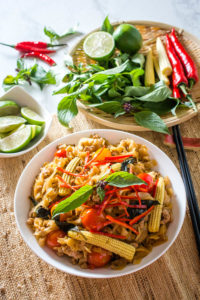
Pad Kee Mao (Thai Drunken Noodles)
Ingredients
Pad Kee Mao Stir-fry
- 1 lb fresh wide rice noodles or 8oz dried noodles
- 3 tablespoons cooking oil divided
- ½ lb ground pork
- 2 cloves garlic minced
- ½ onion sliced
- 6 pieces baby corn sliced lengthwise
- 1 - 2 Thai bird chili thinly sliced
- 2 ½ cups fresh Thai basil divided
- 2 cups cherry or grape tomatoes
- 1 lime cut into wedges
Pad Kee Mao Sauce
- 1 tablespoon soy sauce
- 1 tablespoon oyster sauce
- 1 tablespoon rice vinegar
- 2 teaspoons fish sauce
- 1 teaspoon dark soy sauce
- 2 teaspoons brown sugar
Instructions
- If you are using dried wide rice noodles, soak them in warm water for at least 30 minutes. Drain well, then coat them in about a tablespoon of cooking oil to prevent them from sticking.
- Prepare the sauce by combining soy sauce, oyster sauce, rice vinegar, fish sauce, dark soy sauce and brown sugar.
- Heat 2 tablespoons of cooking oil to your wok over medium-high heat. Add ground pork, and stir-fry until the pork is fully cooked. Remove the ground pork from the wok and set aside.
- Add 1 more tablespoon of cooking oil to the wok, followed by minced garlic, sliced onion, and baby corn
- Add the sliced Thai bird chili if using. Omit if you prefer a non-spicy dish.
- Add the noodles to the wok, followed by the prepared sauce. Toss to coat the noodles evenly.
- Return the cooked ground pork to the wok.
- Add tomatoes and 2 cups of fresh Thai basil to the noodles. Stir to combine all the ingredients.
- Serve immediately with the remaining fresh basil leaves and lime wedges.
Notes
- Do not boil dried noodles — it can make them mushy and prone to breaking.
- Thai basil is preferred, but holy basil or regular basil can be used if needed.
- For a vegetarian version, use tofu and substitute fish sauce with soy sauce or mushroom sauce.

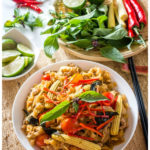
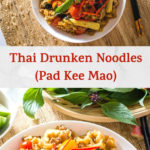
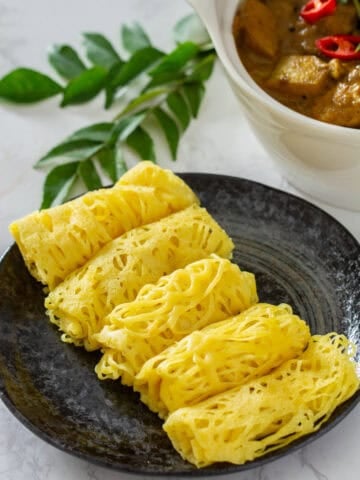
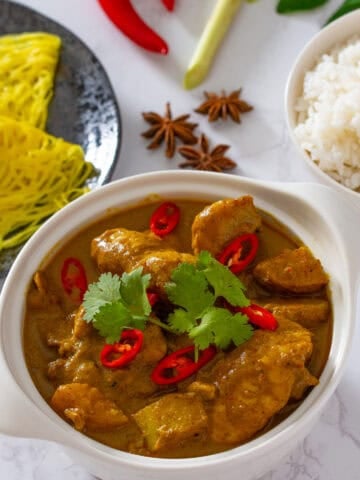

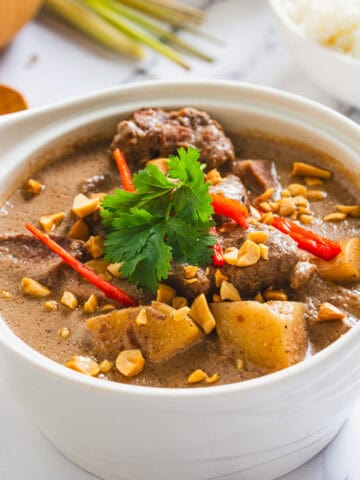
[…] Pad Kee Mao […]